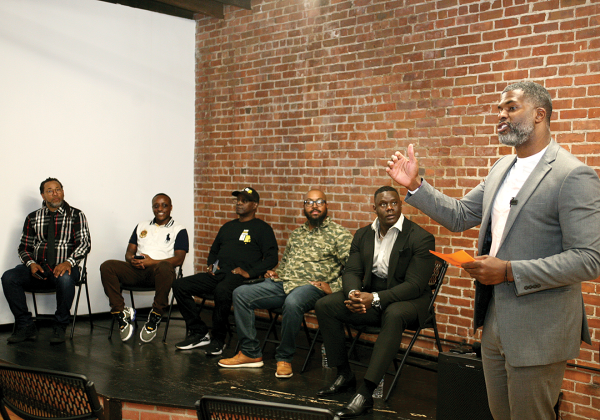October 31, 2024

A forum held on Oct. 23 in Nubian Square addressed ‘Black Men’s Views on Kamala Harris,’ and sparked a lively conversation on the much-discussed topic ahead of the presidential election. Panelists included Cleon Byron, Juwan Skeens, Dana Supreme Richardson, Antonio Miles, and Will Onuoha. Moderator James Lambert III is shown here starting off the conversation – dubbed ‘Unfiltered Voices.’
Seth Daniel photo
A forum held in Roxbury’s Nubian Square last week took a look at the role of Black male voters in the presidential election and whether or not that constituency might break in favor of Vice President Kamala Harris.
“We wanted to have a conversation and maybe it’s not what the dominant group wants us to speak on,” explained moderator James Lambert III, who surfaced subjects like Harris’s Blackness, Democratic policies on guns, and the oversexualization of Black men and women in politics. The forum was titled “Unfiltered Voices.”
While audience members participated, a panel drove the conversation, including people voting for Harris, like Dorchester business owner Cleon Byron and non-profit leader and former candidate Juwan Skeens. Dana Supreme Richardson of Black Lives Matter Rhode Island was also on the panel along with two self-described conservative men staying independent or perhaps leaning to Trump – Dorchester firearms safety instructor Antonio Miles and Boston Water and Sewer attorney Will Onuoha.
“Is Kamala Harris really Black?” inquired one young man in the audience, who questioned the VP’s connection to African Americans. Byron responded that separating African Americans from other Black Americans is not productive.
“The fight for Black Americans is with the US,” he said. “The fight for Haitians is with the French. The fight for Jamaicans is with England. To me, we’re all Black and we’re all fighting the same fight. I think of Marcus Garvey and Stokely Carmichael…These are powerful people that came from the Caribbean and were part of the revolution…These separations will keep us weaker and not stronger.
Added a Haitian woman in the audience: “At the end of the day, the American people that don’t look like us aren’t going to make the distinction between whether my grandparents were from Haiti or if they were from Mississippi or Alabama.”
Onuoha said Harris’s campaign has not done a good job making her relatable to African Americans.
“She talks about washing collard greens in the bathtub,” he said. “I was a housing inspector and if you wash collard greens in the bathtub, I would condemn your house. It’s not sanitary. I don’t think a lot of Black people do this. It’s an overreach to try to connect to the Black experiences.”
Skeens and others in the audience noted that flirting with “sitting out” or voting for Trump was ignoring the obvious.
“I’m really for Kamala because she’s a great choice,” Skeens said. “It’s 32 indictments versus someone who prosecuted indictments. We have a decision…I’m looking at different components. I look at Jan. 6.”
The discussion also turned to whether misogyny played a role in men’s hesitancy to vote for a woman for president. In one exchange, Byron and Onuoha differed on the idea of “misogynoir,” a term used to suggest a disdain in particular for Black women.
“I’m going to appeal to the term misogynoir when it comes to Black women and Kamala Harris,” said Byron. “Let’s keep it real. Men are not voting for her because she is a woman.”
Interjected Onuoha: “That’s not true!”
“I have barbershop groups I go to as well… and a lot of my friends there are pro-Trump and I have to listen to that,” retorted Byron.
Miles countered, “You said that men around you aren’t voting for Kamala Harris because she’s a woman. It’s policy versus person at the end of the day…I’m not going to vote for her because of her personal identity…I’m not voting for her because I don’t agree with her policies.”
While Black women in the audience consistently spoke up in favor of Harris, some men expressed disappointment in the Democratic Party.
“The way the party and America is talking to us and gaslighting us, that’s why Black men are walking away,” said Reggie Stewart, who said he did not plan to vote for any presidential candidate this time. “I’m not voting for Kamala Harris or Trump. Get these cops out of my face. Get us a progressive candidate that aligns with my and our progressive values as Black men. Then come talk to me in 2028.”
For all that, several women in the room sounded the alarm, and claimed Trump wanted to weaponize the police against Black and Brown communities.
“When he does what he told you that he’s going to do, you have to live with your decision— if you make it through that terrorism,” said one woman.
Onuoha called for Black voters to align as independents, thus “swaying elections.”
Rev. Chris Sumner said this was a time to heal these wounds and not let them fester. “We’ve been harmed by the Democratic Party and that put us in this place as Black men with this gender thing signifying an unhealthiness in our culture,” he said. “We need to confront this because we didn’t have the opportunity with Hillary – who harmed Black men and called them super-predators. There’s some tremendous trauma with Black men and Black women and we need to use this time to get well and make a healthy vote.”
Richardson said it’s time for Black men to vote and get the right people in place.
“The windows are open,” he said. “We just have to get the right people in the building. So far, we have people that go along to get along.”


